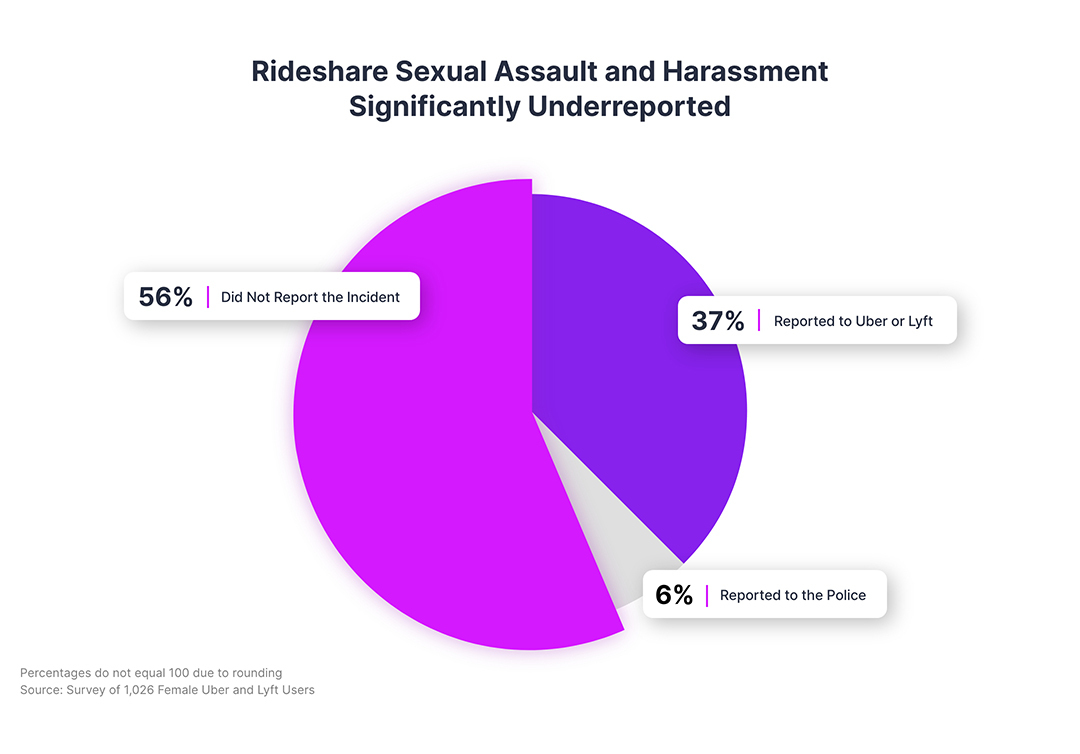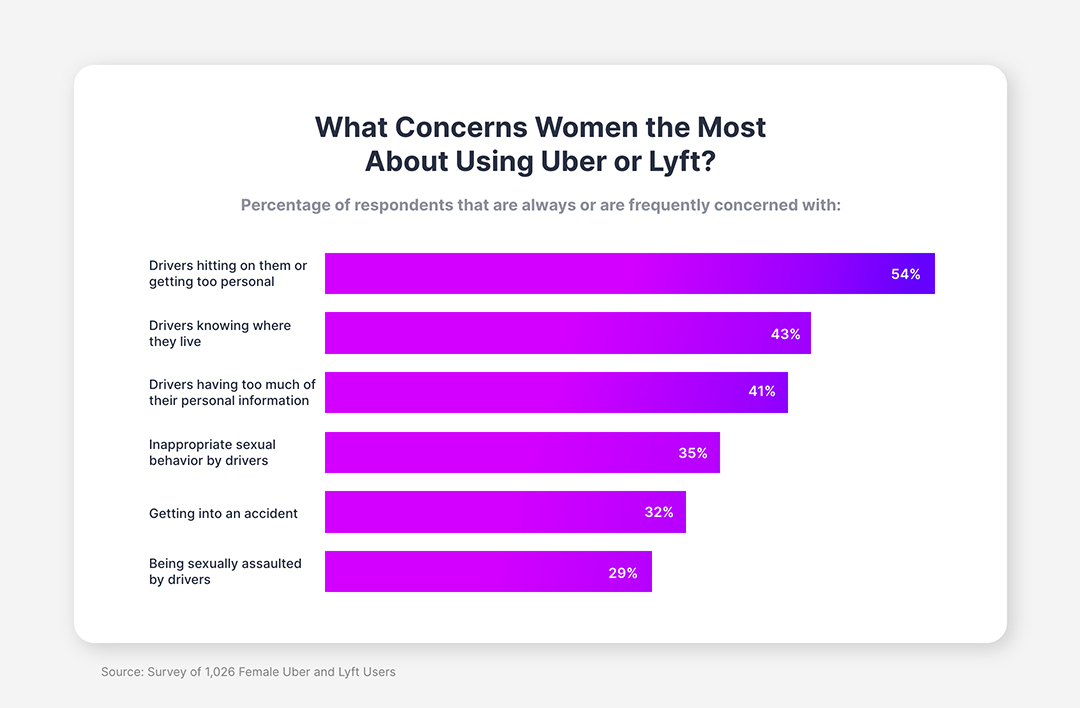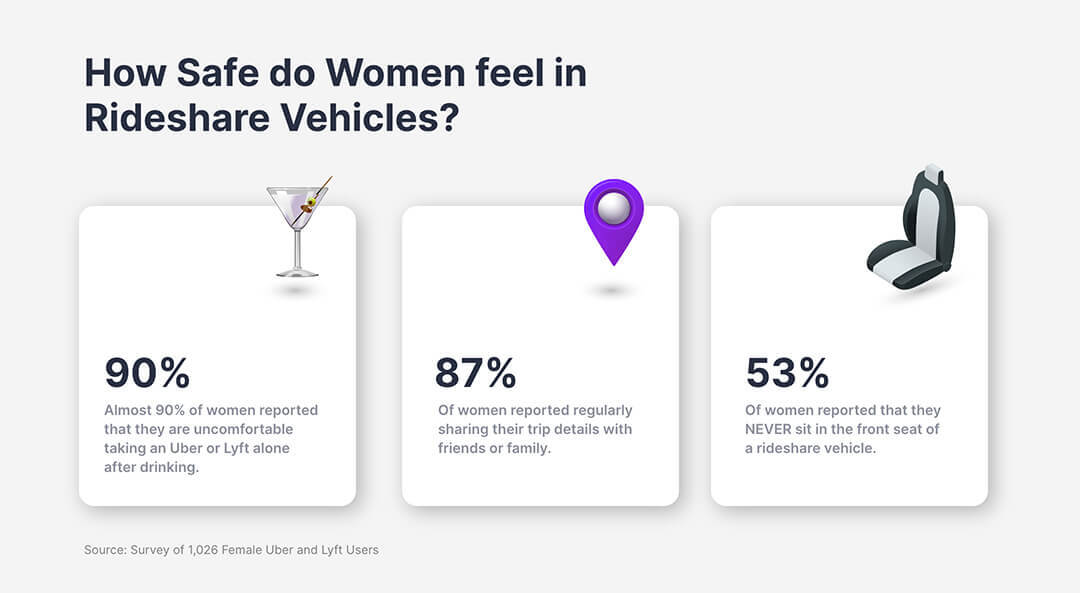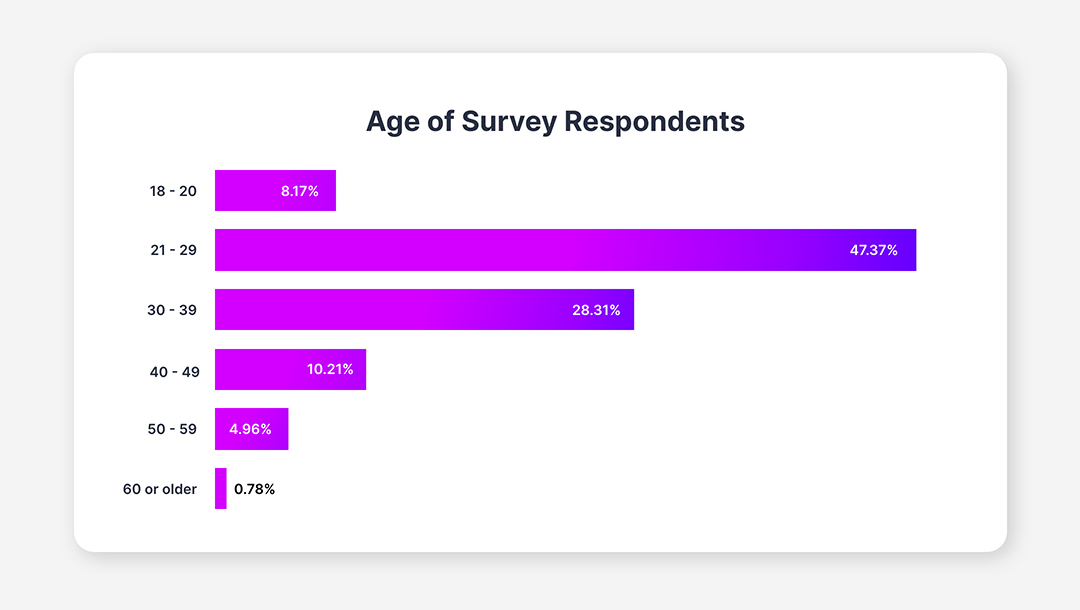More Americans are using rideshare services than ever before. In fact, 36 percent of adults reported having taken a Rideshare or Lyft at least once. Usage among younger, more affluent adults in urban areas is even higher.
However, while Rideshare and Lyft services are convenient and cost-effective for most, they do not come without risk. Notably, reports of sexual assault among female passengers have also become more and more frequent.
Rideshare companies have pledged their commitment to the safety of their passengers but are largely self-regulated. How do women actually feel about their safety in Rideshare and Lyft vehicles and how does that compare with the reality?
We surveyed over 1,000 female Rideshare and Lyft users to find out. We found that women may not feel that these services are as safe as they claim to be.
In fact, nearly half of female Rideshare and Lyft passengers (42 percent) reported that they have been sexually harassed by their driver.
Worse still, one-third (35 percent) said a driver had touched them without their consent and made them feel uncomfortable – 12 percent of whom were touched on a sexual body part.
Rideshare Companies and Women are Aware of the Issues
We asked survey respondents what they are most concerned about when taking a Rideshare or Lyft ride.
We found that female passengers are more concerned about the driver’s behavior and access to their personal information than they are about getting into an accident. In fact, the top four responses revolved around those issues:
- Drivers hitting on them or getting too personal – 54 percent
- Drivers knowing where they live – 43 percent
- Drivers having too much personal information -41 percent
- Inappropriate sexual behavior by drivers – 35 percent
Being involved in an accident came in fifth at 32 percent, just ahead of being sexually assaulted.
As a result of this understanding, female riders have begun adjusting their behaviors accordingly.
According to our survey:
• Almost 90 percent reported that they are uncomfortable taking a Rideshare or Lyft alone after drinking.
• 87 percent of women regularly share their trip details with friends or family
• 53 percent of women reported that they never sit in the front seat of a rideshare vehicle.
After a lot of public pressure, Rideshare released their own rideshare safety data for 2017-2018 last December. It included 5,981 sexual assaults reported in Rideshare U.S., which is certainly not a small number, despite the number of trips they provide each year. As of this date, Lyft has yet to provide a public report.
Reporting is an Issue:
The Rideshare’s data, which is self-reported and not provided by an unbiased third-party, raises as many questions as it answers. To begin, does it represent the true number of incidents?
Underreporting of sexual assault is a major issue – and not just in rideshares. Overall, only about 25 percent of sexual assaults were reported to police in 2018, according to the U.S. Department of Justice, Bureau of Justice Statistics (BJS). However, when it occurs in a rideshare vehicle, survivors may be even less likely to report it.
Of the women in our survey who experienced a situation they felt they should report:
- Only six percent reported it to the police.
- 37 percent reported it to the rideshare company.
- More than half (56 percent) did not report at all.

What this likely means is that there are significantly more incidents than appear in Rideshare’s safety report.
Survivors of sexual assault – of all ages – do not come forward for many reasons. They feel shame, guilt, and/or fear. They fear no one will believe them. They fear being blamed, misunderstood and isolated by society. They fear retaliation. They may internally downplay an incident as not a big deal, even though it constituted assault. Sometimes, survivors feel they lack a voice, and that even if they do report, it won’t make any difference at all.
Overcoming these emotional barriers takes time, years of therapy, and a strong support system. That support system includes rideshare companies, law enforcement, and the court system; how these individuals listen and respond to survivors of sexual assault matters.
Why is Underreporting a Problem?
Without reporting, little to no action can be taken, and without action, no real change can be made to protect the riders and prevent future victimization. Underreporting means:
- Survivors may never receive the support, closure, or justice they deserve.
- Companies may never take action on the driver, including permanent deactivation of the driver’s account.
- Without legal action (civil or criminal), there would be no way to hold the perpetrator accountable.
- There would be no impetus for the company to make real changes to protect riders.
Safety Tips for Riding:
The rider’s safety is paramount. Rideshare companies, as service providers, have an inherent responsibility to ensure rider safety and to deter criminal and inappropriate behavior through vigilant employment policies and policy enforcement.
The data shows that female riders in their twenties, who are riding alone, in the passenger’s seat, at night, or under the influence of alcohol, are especially vulnerable to sexual assault.
While the burden of ensuring safety is on the rideshare companies, following these tips can help increase your safety as a rider:
- Check the driver’s rating before reserving
- Verify the driver’s license plate before getting in
- Notify a friend or a family member of your location
- Set and keep clear boundaries with the driver
- Avoid sitting in the passenger’s seat, if possible
- Ride with a friend, if it is late at night, or alcohol is involved
Most importantly, if something doesn’t feel right, trust that gut feeling. Know you don’t have to tolerate anything that makes you feel uncomfortable.
What to do if you experience anything (from sexual harassment to sexual assault): What can you report?
The rider can and should report any unacceptable or inappropriate behavior to the rideshare company and law enforcement. This includes any unwelcome touching or harassment. While it is normal to want to disregard or deny what happened to you, no one has the right to violate your personal boundaries, in or out of the rideshare vehicle.
Reporting isn’t easy, and it can feel obtrusive and intimidating in the moment. However, reporting can also be an avenue to take back control – to hold the perpetrator accountable for his actions, and to help keep other riders safe.
If riders have privacy concerns, they also have the option to report anonymously. For more information on how to report anonymously and file a lawsuit, visit our guide.
Methodology & Fair Use:
The data presented comes from a 2019-2020 survey of 1,000 randomly selected female riders of rideshares. It shows the prevalence of sexual assault in rideshares across major cities.
Nearly half of the survey respondents (47 percent) are between the ages of 21-29, which isn’t surprising since young adults, ages 18-29, are most likely to use ride-share services.
If you would like to republish any of the survey data, images or findings within, please provide credit by linking to this page.




